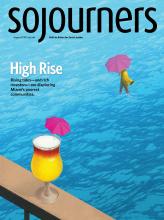IN 2016, VOTERS faced extensive efforts to make voting more difficult, particularly for people of color and those who are poor. These efforts at voter suppression occurred as a result of GOP gains in governors’ races and state legislatures while Barack Obama was president—and also as a result of the Supreme Court gutting a key provision of the Voting Rights Act in 2013.
Between those two factors, 23 states—including some key battlegrounds in the presidential election—had new voter restrictions in place for the 2016 election. Examples include laws that eliminated polling places or moved them to less accessible locations, reduced polling hours, tightened voter-ID requirements, “purged” voter rolls, and reduced early voting and Sunday voting, which are popular among minority voters in certain regions.
As we approach the 2018 midterms, we need to protect the right to vote for citizens of all races, economic levels, and political persuasions. This is an imago dei issue: If we believe that all human beings are created in the image of God (Genesis 1:26), then efforts to prevent some of God’s children from exercising their franchise must be opposed as a matter of fidelity to our faith. It’s also a Matthew 25 issue: If we believe that how we treat people living in poverty and those who have been caught up in the system of mass incarceration is how we treat Christ himself, then we have a clear Christian mandate to ensure that society’s most vulnerable can exercise the right to vote.
In-person voter fraud is vanishingly rare, to the tune of only 31 documented cases out of 1 billion ballots cast between 2000 and 2014. To put it another way, the odds that any given person will attempt in-person voter fraud are something like 1 in 32 million, significantly lower than the odds of being struck by lightning. Twice.
Read the Full Article

